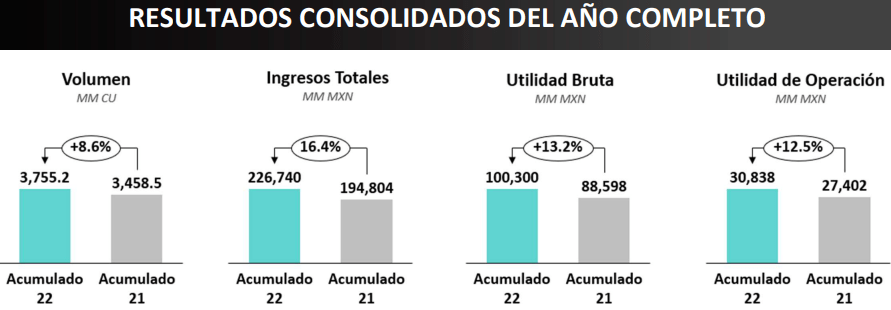Coca-Cola FEMSA, the largest bottler of Coca-Cola products, increased its revenues by 16.4% and operating income by 12.5% in 2022 over 2021.
As a result, the company‘s revenues totaled 226.74 billion dollars and its operating income totaled 30.838 billion pesos.
The company produces and distributes beverages under The Coca-Cola Company’s trademarks, offering a broad portfolio of 131 brands to more than 266 million consumers every day.

In 2022, consolidated volume increased 8.6% driven by volume growth in all of its territories, including double-digit increases in Brazil, Colombia, Argentina and Guatemala, along with solid performance in Mexico and Uruguay.
On a comparable basis, volume increased 7.5 percent.
Comparable revenues increased 17.8 percent, driven primarily by its pricing initiatives, a favorable price-mix effect and volume growth.
Conversely, these factors were partially offset by a decline in beer revenues related to the portfolio transition in Brazil and unfavorable currency translation effects.
Comparable operating income increased 11.6%, driven mainly by sales and operating expense efficiencies.
These effects were partially offset by higher raw material costs, coupled with a high basis of comparison including the recognition of non-recurring extraordinary tax effects in Brazil during 2021.
Coca-Cola FEMSA
With more than 80,000 employees, the company markets and sells approximately 3.5 billion unit cases through 2 million points of sale per year.
Operating 49 manufacturing plants and 260 distribution centers, the company’s operations span territories in Mexico, Brazil, Guatemala, Colombia, Argentina, and, domestically, in Costa Rica, Nicaragua, Panama, Uruguay and Venezuela through its investment in KOF Venezuela.
Coca-Cola FEMSA’s total revenues were driven primarily by volume growth, its pricing initiatives to offset rising raw material costs, and favorable price-mix effects.
These factors were partially offset by a decline in beer revenues related to the transition of the beer portfolio in Brazil and unfavorable translation effects of most of its operating currencies into Mexican pesos.
On a comparable basis, excluding mergers and acquisitions and currency translation effects, total revenues would have increased 17.8 percent.
![]()

